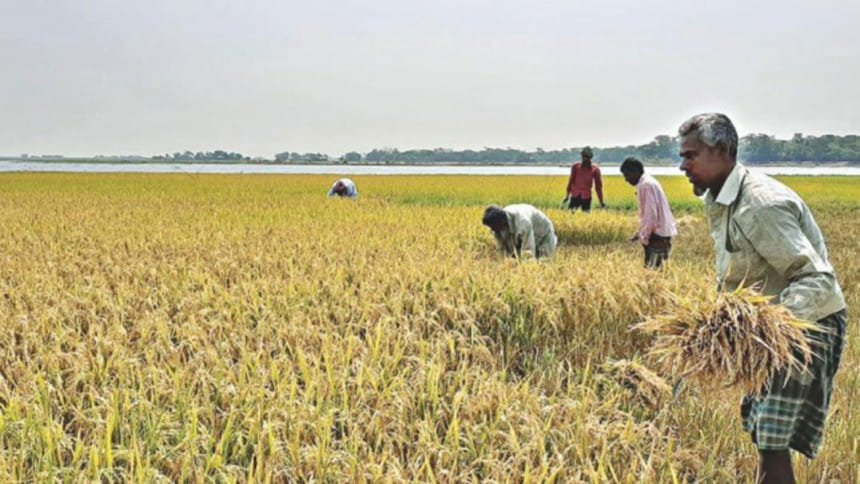Govt to buy more from farmers

In the wake of a sluggish progress in the government's Boro procurement programme, the food ministry has lifted the ceiling for paddy and wheat purchase from an individual farmer to six tonnes from the previous three tonnes.
The relaxation of the current restriction came as the Directorate General of Food (DGF) has so far bought 29,000 tonnes of Boro paddy, which is only 4 percent of the annual procurement target of 800,000 tonnes, said a notification issued by the ministry on June 14.
The DGF, however, is supposed to procure 30 percent of its total target by the end of June.
The drive, which began on April 26, would end on August 31.
"Initially, we focused on buying from small and marginal farmers so that they get fair prices. Now to speed up the procurement, we have widened the scope so that the big farmers can also provide paddy to us," said Sarwar Mahmud, director general at the DGF.
The government has doubled its Boro procurement target this year compared to the last year's target of 400,000 tonnes in an attempt to tackle the aftermath of the coronavirus pandemic.
Food officials claimed farmers were more interested to sell their produces in local markets this year as the gap between market prices and the prices offered by the government has narrowed.
He said the ceiling was lifted to attract the farmers as selling a bulk amount would reduce their incidental costs.
Food officials earlier said growers were opting not to supply the crop to public warehouses as the government does not buy paddy having over 14 percent moisture, whereas they can sell the paddy at markets where the moisture content is not taken into consideration.
A senior food official in Rangpur said farmers were getting Tk 800 for each maund of paddy with 20-21 percent moisture in the grains.
They would lose five to six kilograms in each maund if the moisture level is brought down to 14 percent, he said.
Moreover, many traders buy the paddy from the farmers' yards whereas the government procurements take place at designated depots, which involves a carrying cost.
"So if all these factors are taken into account, prices the farmers get from market have become close to the prices offered by the government," the official said.
The government is paying Tk 1,040 for each maund of paddy this year.
Asked about the risk of traders supplying paddy to public depots, Sarwar said no one, except the farmers enlisted by the Department of Agricultural Extension, would be able to supply paddy at the government storages.
The food ministry notification said medium and large farmers should be selected through lotteries from the actual list of farmers.
"And in no way, paddy can be procured from traders or middlemen," it said.
A recent study by International Food Policy Research Institute (IFPRI) recommended that the government should purchase paddy irrespective of moisture level.
The study, commissioned by the Ministry of Agriculture, said paddies usually have a higher level of moisture and it is difficult for farmers to dry their produces and maintain the required moisture level before selling.
"Therefore, the procurement price would be adjusted based on the moisture of farmers' paddy," it said, adding that paddy with higher moisture contents could be bought at relatively lower prices.
On the issue, DGF Chief said it was not easy to implement the recommendation as there is no drier at the depots and no separate storages to store the moist paddy.
It will be possible to buy paddy irrespective of moisture content when paddy silos will be set established, said Sarwar, adding that the DGF has submitted a proposal to Planning ministry to establish 30 paddy silos.

 For all latest news, follow The Daily Star's Google News channel.
For all latest news, follow The Daily Star's Google News channel. 




Comments